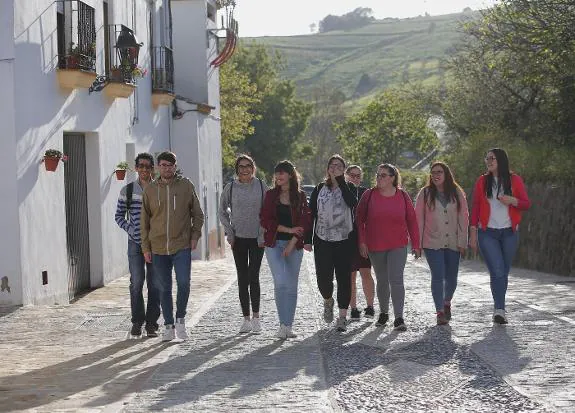Young people: the greatest treasure of the smallest village in Malaga province
In Atajate, 37 inhabitants are under the age of 30. The youngsters appreciate the advantages of rural life but say they will have to leave to find work
NURIA TRIGUERO
Viernes, 4 de mayo 2018, 10:10
Two bars and a bakery; that is what Atajate has to offer in the form of commerce. The school has 11 pupils, all in the same class. The teachers are shared with two other villages, Benadalid and Benalauría. There is no secondary school; those pupils have to travel to Cortes de la Frontera or Ronda. The bus to Ronda leaves at 8am and returns at 2pm. There is no public transport at weekends or on public holidays. The doctor comes three days a week, and the only bank closed down some time ago. Life in Malaga's smallest municipality - 167 inhabitants, according to last year's population register - has limitations which for many city-dwellers would be impossible to accept, but local people do enjoy other benefits. Tranquility, quality of life, contact with nature, cleanliness, 'kilometre zero' food products, friendly neighbours and reasonably-priced housing, among others.
The youngsters in this village which nestles in the Genal valley appreciate these aspects of rural life, but they complain, especially about the lack of public transport and shops. They would like to stay in Atajate, but realise they will probably have to leave because there is no work here. In Atajate, there are 37 inhabitants under the age of 30. In absolute figures, it is the municipality with the lowest number of young people in the province, but in relative terms they form 22 per cent of the population. This is lower than the provincial average (32 per cent) but higher than in villages such as Alpandeire, Comares and Sedella, where youngsters comprise less than 20 per cent. In addition, the number of young people in Atajate has increased in the past ten years; something to celebrate, given the general trend in the Genal valley.
Children and young people are treasured in Atajate. The council, despite its modest resources, employs Lorena Peña who helps them study, works with them on aspects of lifesuch as sexual and affective education and organises leisure, sports, cultural and voluntary activities. I have a double mission: I want them to enjoy themselves, of course, but also to know other realities and understand what happens in society, she says.
In the village there are 19 people aged between 16 and 30, with whom Lorena works. Two are at Malaga university and come home every two or three weekends, to see their families and friends. Others are at school in Cortes or Ronda, some work in nearby towns or villages and a few are not studying or working at present. Lorena meets them several times a week: on Tuesdays for classes, on Friday evenings they get together to eat and chat at the Punto Joven - a youth centre with a TV, video consoles, books and table games which the town hall provides free of charge, and on Saturdays there is always an activity of some type: walking, day trips, talks, volunteer sessions...
Rocío del Río, who is 21, is relatively new to Atajate -she moved there three years ago from San Pedro Alcántara- and can compare life in the two different worlds. People who grew up here take it for granted, but for me to have a free gymnasium, a swimming pool for one euro, a place like the Punto Joven and activities every weekend is something I have never seen anywhere else, she says. She agrees that the main inconvenience of living in Atajate is the lack of public transport. If you don't have a car and you need to go shopping in Ronda in the afternoon you have to rely on your parents to take you, she says. Needless to say, all the youngsters in the village plan to learn to drive as soon as they are 18.
Attached to their roots
None of them foresee their future in the village, but they would all like to stay. Lorena says the authorities should do something so the youngsters don't have to move away. They should be given training and help to identify opportunities, such as rural tourism, she says. Only one young resident has thought of setting up a business, repairing computers, but decided it wouldn't be profitable. There is everything in Ronda. Nobody would come here, he says.
